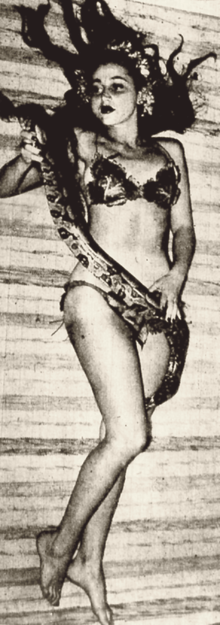Luz del Fuego
.png)
Luz del Fuego (née, Dora Vivacqua; early stage name, Luz Divina; February 21, 1917 – July 19, 1967) was a Brazilian feminist, ballerina, naturist, and striptease artist who performed with live snakes.[1][2][3] Comfortable with nudity, she wrapped pythons wrapped around her body and became famous in her time.[3]
Biography
Born in Cachoeiro de Itapemirim, Espírito Santo, she was the fifteenth child of the Italian immigrants Etelvina and Antonio Vivacqua, and the sister of Senator Attilio Vivacqua.[3] In the 1930s, she was hospitalized in Belo Horizonte for two months because of her parents' claims that her behaviour was schizophrenic.[3] After her release, Vivacqua moved to one of her brother's farm. There, she assaulted her brother, put grape vines on her breasts and pubis, and carried two vine snakes. She was hospitalized again, this time in Rio de Janeiro.[3]

In 1944,[3] she began performing as a dancer using the stage name "Luz Divina",[2] changing it to Luz del Fuego in 1947,[3] the name of a lipstick in the Argentine market.[4] In 1946, she appeared in Franz Eichhorn's film No Trampolim da Vida, and the following year, starred in Luis Moglia Barth's Argentine-Brazilian co-production Não Me Digas Adeus.[5] In 1948, she appeared in Moacyr Fenelon's musical comedy Poeira de Estrelas opposite Lourdinha Bittencourt and Emilinha Borba, and also had a role in Manoel Jorge and Hélio Thys's musical comedy Folias Cariocas.[6]
On the Ilha do Sol (Sun Island),[7] she established the first naturist club in Brazil, the "Brazilian Naturist Club". In the early 1950s, she founded a political party called the Brazilian Naturist Party and ran for Congresswoman for this party.[8] She lost the election as her brother, Attilio, denied the party's official establishment.[3] In 1956, she made an appearance in Curt Siodmak's Curucu, Beast of the Amazon which was being filmed in rural Argentina,[9] and in 1959 starred in Al Ghiu's comedy picture Comendo de Colher. Del Fuego had a final role, which went uncredited, in Robert Day's Tarzan and the Great River in 1967 before she was murdered by a fisherman that year whom she had threatened to denounce for overfishing.[8]
Legacy
Her life was portrayed in the 1982 film, Luz del Fuego, directed by David Neves and featuring Lucélia Santos in the lead role.[10] In November 2013, a lost documentary titled A Nativa Solitária was found by the Espírito Santo Public Archive and restored by it.[11] Because of her courage to face the prejudice of her time with regard to nudity, and for pioneering the creation of the first naturist club in Brazil, her birth date, February 21, is remembered and celebrated among Brazilian naturists as "Day of Naturism".[3]
References
- ↑ "Luz Del Fuego (1982)". The New York Times. Retrieved 22 June 2014.
- 1 2 Revista estudos feministas (in Portuguese). CIEC, Escola de Comunicação, UFRJ. 1994. p. 545.
- 1 2 3 4 5 6 7 8 9 "Luz del Fuego". O Estado de S. Paulo (in Portuguese). Grupo Estado. Retrieved 22 June 2014.
- ↑ Scolforo, Jória Motta. "Arquivo Público remasteriza o raro documentário "A Nativa Solitária" com Luz del Fuego" (in Portuguese). Arquivo Público do Estado do Espírito Santo. Archived from the original on 31 May 2015. Retrieved 22 June 2014.
- ↑ Neto, Antonio Leão da Silva (1 January 1998). Astros e estrelas do cinema brasileiro (in Portuguese). Edições Loyola. p. 143. ISBN 978-85-900595-1-6.
- ↑ "Folias Cariocas" (in Portuguese). Internet Entertainment Database. Archived from the original on 28 January 2015. Retrieved 22 June 2014.
- ↑ "Jayne Too Modest to Visit Nudist Colony". Tucson Daily Citizen. Gannett Company. February 28, 1959. p. 2.
- 1 2 Schumaher, Schuma; Brazil, Erico Vital (2000). Dicionário mulheres do Brasil: de 1500 até a atualidade : com 270 ilustrações (in Portuguese). Zahar. pp. 347–348. ISBN 9788571105737.
- ↑ Weaver, Tom (2000). Return of the B Science Fiction and Horror Heroes: The Mutant Melding of Two Volumes of Classic Interviews. McFarland. p. 308. ISBN 978-0-7864-0755-2.
- ↑ "Luz del Fuego" (in Portuguese). Cinemateca Brasileira. Retrieved 22 June 2014.
- ↑ "Arquivo do ES digitaliza filme raro de 1954". A Gazeta (in Portuguese). Globo.com. November 16, 2013. Retrieved 22 June 2014.